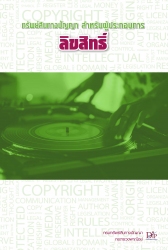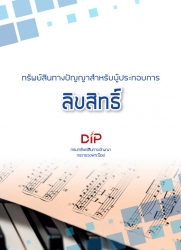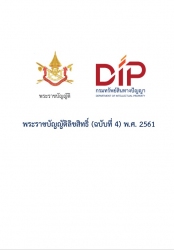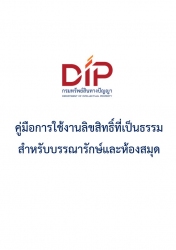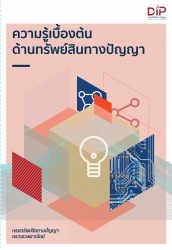
Author : กรมทรัพย์สินทางปัญญา
Publishing Date : Jan 15, 2018
ความรู้เบื้องต้นเกี่ยวกับทรัพย์สินทางปัญญาของไทย
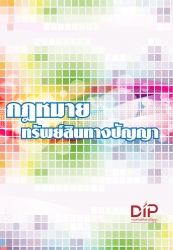
Author : กรมทรัพย์สินทางปัญญา
Publishing Date : Jan 12, 2018
รวมกฎหมาย พระราชบัญญัติทรัพย์สินทางปัญญาที่แก้ไขปรับปรุง (เลือกอ่านแบบหน้าเดี่ยว ตัวหน้าสือจะขยาย อ่านได้สะดวก)
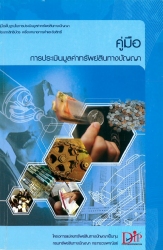
Author : กรมทรัพย์สินทางปัญญา
Publishing Date : Jul 13, 2020
คู่มือพื้นฐานในการประเมินมูลค่าทรัพย์สินทางปัญญาประเภทสิทธิบัตร เครื่องหมายการค้าและลิขสิทธิ์
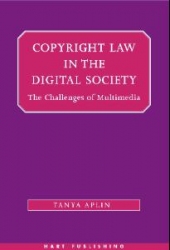
Author : Tanya Aplin
Publishing Date : Sep 10, 2014
examines the extent to which copyright and database right protect multimedia works. It does so from the perspective of UK law, but with due attention being paid to EU law, international treaties and comparative developments in other jurisdictions, such as Australia and the U.S. The central argument of the book is that the copyright and database right regimes are, for the most part, flexible enough to meet the challenges presented by multimedia. As a result, it is neither necessary nor desirable to introduce separate copyright protection or sui generis protection for multimedia works.
This important and original new work will be essential reading for any lawyer engaged in advising on IP matters relating to the new media industries, and scholars and students working in intellectual property and computer law.
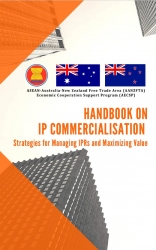
Author : The ASEAN Secretariat
Publishing Date : Mar 12, 2020
This Handbook is designed for business people of ASEAN Member States, Australia and New
Zealand.
In aid of understanding, some examples have been provided, but these are mere illustrations and do
not provide judgment and do not constitute commercial or legal advice. Views or conclusions may
have also been expressed but these should NOT be taken as legal or commercial advice. Any part of
the content of this publication (including images, graphics, trademarks or logos) is only intended for
informational and educational and educational purpose only.
The author and the ASEAN Secretariat have taken due diligence in the preparation of this
publication. However, they shall not be held liable for any omissions or inaccuracies in the content of
this publication. Neither the authors, the ASEAN Secretariat, Australian and New Zealand
Governments accept any liability for any claims, loss or expenses that may arise or arising from use

Author : Simon Stokes
Publishing Date : Mar 06, 2015
The first edition of this book in 2002 was the first UK text to examine digital copyright together with related areas such as performers' rights, moral rights, database rights and competition law as a subject in its own right. Updated editions have included the UK implementation of the 2001 Information Society Directive and commentary on user-generated content and the development of Web 2.0 and beyond. Now in its fourth edition, the book has been updated and revised to take account of legal and policy developments in copyright law and related areas, in particular the increasing role of the Court of Justice of the European Union in shaping EU copyright law. The book helps put digital copyright law and policy into perspective and provides practical guidance for those creating or exploiting digital content or technology, whether in academia, the software, information, publishing and creative industries, and other areas of the economy. The focus is on the specifics of the law in this area together with practical aspects, including precedents and precedent checklists dealing with common digital copyright transactions. The latest edition has been expanded to include a discussion of Open Access, eBooks and app development and licensing. Both academics and practitioners will find the book an invaluable guide to this rapidly developing field of law.
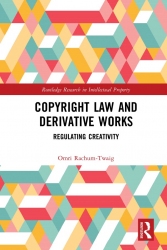
Author : Omri Rachum-Twaig
Publishing Date : Oct 26, 2018
Copyright law regulates creativity. It affects the way people create works of authorship ex-ante and affects the status of works of authorship significantly ex-post. But does copyright law really understand creativity? Should legal theories alone inform our regulation of the creative process?
This book views copyright law as a law of creativity. It asks whether copyright law understands authorship as other creativity studies fields do. It considers whether copyright law should incorporate non-legal theories, and if so, how it should be adjusted in their light. For this purpose, the book focuses on one of the many rights that copyright law regulates – the right to make a derivative work. A work is considered derivative when it is based on one or more preexisting works. Today, the owner of a work of authorship has the exclusive right to make derivative works based on her original work or to allow others to do so. The book suggests a new way to think about both the right, the tension, and copyright law at large. It proposes relying on non-legal fields like cognitive psychology and genre theories, and offers new legal-theoretical justifications for the right to make derivative works.
As the first book to consider the intersection between copyright law, creativity and derivative works, this will be a valuable resource for students, scholars, and practitioners interested in intellectual property and copyright law.
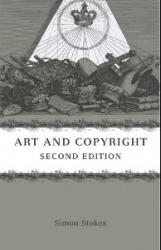
Author : Simon Stokes
Publishing Date : Sep 25, 2014
The intellectual property protection afforded to works of art is receiving increased attention by artists, museums, galleries, auction houses, publishers and their professional staff and legal advisors, as well as by those teaching or studying copyright and/or the law of cultural property.
Contemporary artists are pushing copyright law to extremes. The European Union is likely to soon formally adopt an artists’ resale right (droit de suite) directive. The recent adoption of the digital copyright directive will also further strengthen the rights of artists as regards the exploitation of their works via the Internet.
This is the first text to specifically examine in detail the intellectual property rights protecting artistic works and artists’ rights generally in the United Kingdom. The focus is on the UK but where appropriate other relevant jurisdictions are discussed. Recent European developments and the evolving UK case law in this area including the recent House of Lords’ decision in Designers Guild v Russell Williams are also addressed. The Internet and related intellectual property rights to copyright and moral rights are considered as well, including the law of passing off, breach of confidence, trade marks and domain name protection.
123NextLast

